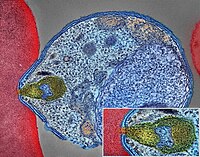
Photo from wikipedia
Background: Seasonal malaria chemoprevention (SMC) with sulfadoxine-pyrimethamine plus amodiaquine (SPAQ) is a malaria prevention strategy recommended since 2012 by the World Health Organization (WHO) for children under 5 years. In… Click to show full abstract
Background: Seasonal malaria chemoprevention (SMC) with sulfadoxine-pyrimethamine plus amodiaquine (SPAQ) is a malaria prevention strategy recommended since 2012 by the World Health Organization (WHO) for children under 5 years. In Senegal, the scaling up of SMC started in 2013 in the south-eastern regions of the country with an extension of the target to 10 years old children. The scaling up of SMC requires regular evaluation of the strategy as recommended by the WHO. This study was conducted to evaluate the effectiveness of SMC. Methods: A case-control study was conducted in some villages of the health districts of Saraya and Kedougou in the Kedougou region from July to December 2016. A case was a sick child, aged 3 months to 10 years, seen in consultation and with a positive malaria rapid diagnostic test (RDT). The control was a child of the same age group with a negative RDT and living in the same compound as the case or in a neighbouring compound. Each case was matched with two controls. Exposure to SMC was assessed by interviewing the mothers/caretakers and by checking the SMC administration card. Results: Overall, 492 children, including 164 cases and 328 controls, were recruited in our study. Their mean ages were 5.32 (+/- 2.15) and 4.44 (+/-2.25) years for cases and controls, respectively. The number of boys was higher in both cases (55.49%; CI 95%=47.54-63.24%) and controls (51,22%; CI 95%=45.83-56.58%). Net ownership was 85.80% among cases and 90.85% among controls (p=0,053). The proportion of controls who received SMC was higher than that of cases (98.17% vs 85.98% and p=1.10 -7). The protective effectiveness of SMC was 89% (OR= 0.12 (CI 95%=0.04-0.28)). Conclusions: SMC is an effective strategy in the control of malaria in children. Case-control studies are a good approach for monitoring the efficacy of drugs administered during SMC.
Journal Title: Wellcome open research
Year Published: 2022
Link to full text (if available)
Share on Social Media: Sign Up to like & get
recommendations!